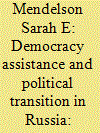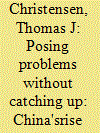| Srl | Item |
| 1 |
ID:
018918


|
|
|
|
|
| Publication |
Spring 2001.
|
| Description |
68-106
|
|
|
|
|
|
|
|
|
|
|
|
|
|
|
|
| 2 |
ID:
018920


|
|
|
|
|
| Publication |
2001.
|
| Description |
107-146
|
|
|
|
|
|
|
|
|
|
|
|
|
|
|
|
| 3 |
ID:
018917


|
|
|
|
|
| Publication |
Spring 2001.
|
| Description |
5-40
|
| Summary/Abstract |
Since the early 1990s, American scholars and strategists have debated whether the People's Republic of China (PRC) will pose a security threat to the United States and its regional interests in East Asia in the next few decades. Although many have focused on intentions as well as capabilities, the most prevalent component of the debate is the assessment of China's overall future military power compared with that of the United States and other East Asian regional powers. So conferences have been held and papers written discussing whether China would become a "peer competitor" or "near peer competitor" of the United States in the military arena, or a "regional hegemon" towering over its cowed neighbors and threatening American interests in a region of increasing importance to the United States.1 [End Page 5]
The debate was hottest in the immediate aftermath of the Cold War era. In the early 1990s, the American economy was suffering and the American military downsizing, while China's economy was growing quickly following the brief post-Tiananmen slump. Moreover, in those years China began increasing its military spending significantly for the first time since 1978. As a result, concerns were expressed about America's ability to maintain its global military presence and supremacy, particularly in East Asia. However, despite a turnaround in the American economy, a slowdown in defense cuts, and the clear persistence of American alliances and internationalism, the question of whether China will become a peer competitor or near peer competitor of the United States in the next few decades still motivates the thinking of many American strategists today. 2
The debate about China as a peer competitor revolves around simple realist notions of how international politics work: Power is what matters; and what matters in power is one's relative capabilities compared with those...
|
|
|
|
|
|
|
|
|
|
|
|
|
|
|
|
| 4 |
ID:
018921


|
|
|
|
|
| Publication |
Spring 2001.
|
| Description |
147-186
|
|
|
|
|
|
|
|
|
|
|
|
|
|
|
|
| 5 |
ID:
018919


|
|
|
|
|
| Publication |
Spring 2001.
|
| Description |
41-67
|
|
|
|
|
|
|
|
|
|
|
|
|
|
|
|